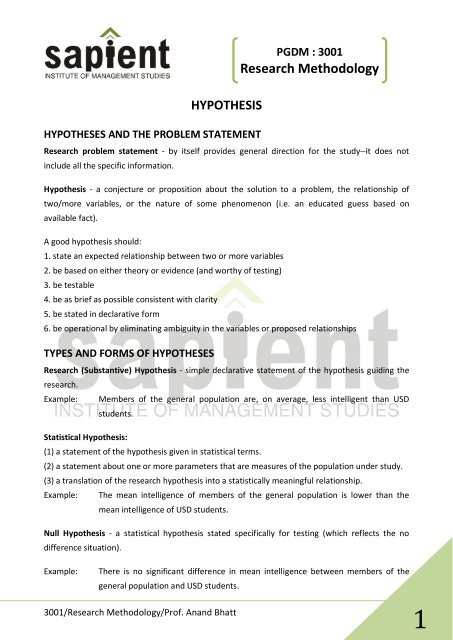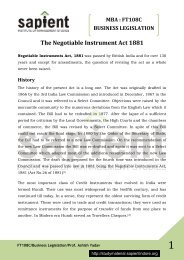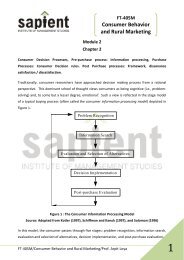PGDM : 3001 Research Methodology
PGDM : 3001 Research Methodology
PGDM : 3001 Research Methodology
Create successful ePaper yourself
Turn your PDF publications into a flip-book with our unique Google optimized e-Paper software.
<strong>PGDM</strong> : <strong>3001</strong><br />
<strong>Research</strong> <strong>Methodology</strong><br />
HYPOTHESIS<br />
HYPOTHESES AND THE PROBLEM STATEMENT<br />
<strong>Research</strong> problem statement ‐ by itself provides general direction for the study‐‐it does not<br />
include all the specific information.<br />
Hypothesis ‐ a conjecture or proposition about the solution to a problem, the relationship of<br />
two/more variables, or the nature of some phenomenon (i.e. an educated guess based on<br />
available fact).<br />
A good hypothesis should:<br />
1. state an expected relationship between two or more variables<br />
2. be based on either theory or evidence (and worthy of testing)<br />
3. be testable<br />
4. be as brief as possible consistent with clarity<br />
5. be stated in declarative form<br />
6. be operational by eliminating ambiguity in the variables or proposed relationships<br />
TYPES AND FORMS OF HYPOTHESES<br />
<strong>Research</strong> (Substantive) Hypothesis ‐ simple declarative statement of the hypothesis guiding the<br />
research.<br />
Example: Members of the general population are, on average, less intelligent than USD<br />
students.<br />
Statistical Hypothesis:<br />
(1) a statement of the hypothesis given in statistical terms.<br />
(2) a statement about one or more parameters that are measures of the population under study.<br />
(3) a translation of the research hypothesis into a statistically meaningful relationship.<br />
Example: The mean intelligence of members of the general population is lower than the<br />
mean intelligence of USD students.<br />
Null Hypothesis ‐ a statistical hypothesis stated specifically for testing (which reflects the no<br />
difference situation).<br />
Example:<br />
There is no significant difference in mean intelligence between members of the<br />
general population and USD students.<br />
<strong>3001</strong>/<strong>Research</strong> <strong>Methodology</strong>/Prof. Anand Bhatt<br />
1
<strong>PGDM</strong> : <strong>3001</strong><br />
<strong>Research</strong> <strong>Methodology</strong><br />
Alternative Hypothesis ‐ an alternative to the null hypothesis that reflects a significant difference<br />
situation.<br />
Example: There is a significant difference in mean intelligence between members of the<br />
general population and USD students.<br />
Directional Hypothesis ‐ a hypothesis that implies the direction of results.<br />
Example: The mean intelligence of members of the general population is significantly lower<br />
than that of USD students.<br />
Nondirectional Hypothesis ‐ a hypothesis that does not imply the direction of results.<br />
Foreshadowed Problems ‐ (in ethnographic research) statements of specific research problems<br />
that provide a focus for the research. They identify factors for the researcher to consider without<br />
specifying anticipated results.<br />
<strong>3001</strong>/<strong>Research</strong> <strong>Methodology</strong>/Prof. Anand Bhatt<br />
2








